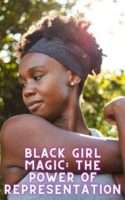Looking in the Mirror…
When I was younger and would look in the mirror, I remember feeling sad. Sad that my hair was too “wild”, my nose was too wide, and that my body felt too curvy compared to what was being praised as the beauty standard. And not just what I saw around me, but in the magazines I read, the TV shows and movies I watched, and the celebrities I looked up to. I’m sure many black girls and women can think of particular moments in their life where they were made to feel less than others; that how they looked was inferior to others.
So much has changed since then, as positive representations of black women in mainstream media have become more prominent in the past few years. Our hair products are more available in stores, and we can follow influencers and other sources of representation that allow us to see ourselves in the media. But where did some of the positive representation that we see come from? It did not just appear out of thin air. A movement that changed (and still changes) the narrative of how black women and girls are represented is the social media movement called #BlackGirlMagic.
What is #BlackGirlMagic?
The hashtag #BlackGirlMagic represents a movement celebrating the power and beauty of black girls everywhere. In 2016, Charlie Brinkhurst-Cuff wrote that #BlackGirlMagic could be used in many different ways: to celebrate graduations, show off the diversity of natural black hairstyles, or show love to black women who are trailblazing in their respective industries. A recent example of #BlackGirlMagic in South Africa would be DJ Uncle Waffles, who, at 22, is taking the world by storm in an industry dominated by men. Her impact is that young generations interested in DJing not only have someone to look up to but are more willing to take a chance to try something they otherwise would not have tried. In 2019, Beyonce released the song “Brown Skin Girl”, which celebrates the beauty of melanin, with “skin just like pearls”. Zukhaila Patel, a prominent South African youth activist, has published a children’s book called “My Coily Crowny Hair”, which tells the story of a girl called Lisakhanya who discovers the versatility and beauty of her natural hair.
Other examples in different industries can be found on the social media page Women Power Africa (WPA). This page shares stories of mainly black women who have conquered hardships and succeeded in different areas like academia, business, science, and more. Young black girls having representation in every facet of life is vital to promoting all that we have the potential to succeed in.
The Power of Storytelling in Movies
The trailer for Disney’s ‘The Little Mermaid was released recently. It showed singer-songwriter Halle Bailey, as the new Ariel. There was a backlash from those who said she is not an accurate representation of a mermaid (even though mermaids are fictional creatures) but of course there were also those who were happy to see themselves represented in this way. Responses from little black girls around the world showed how happy they were to be written into fairy tales. These videos made me feel warm inside – not just because The Little Mermaid was one of my favourite old Disney movies growing up, but also because there is so much power in seeing yourself represented, and knowing the positive impact it will have on younger generations. Seeing ourselves in the things we watch and enjoy is so important. Imagining ourselves as the main characters, as anything we want to be, allows us to imagine a better life for ourselves.
You deserve to become anything you want to be and to write yourself into the stories that matter. It is empowering to know that people like you deserve to be centre stage, and not just to be represented in stereotypical, prejudiced ways that create ignorance in the minds of others. When people think of a mermaid, they can now think of a black woman too. I know a younger me would have loved to watch the new Little Mermaid because of how it would have broadened my imagination and placed me within the fantasy. CaShawan Thompson, the creator of the phrase “black girls are magic”, said that the hashtag is not only to celebrate the visible celebrities that we already know, but is also for uplifting ourselves and other black sisters around us.
Conclusion
Now when I look in a mirror, as an older black woman, I no longer see things I do not have. Instead, I see how the parts of me that I shunned make up the most beautiful, distinct parts of who I am. Having distinctly black features is something to be proud of. My and your ancestors passed these features down to us: our Afros, our wide noses and every other part of us tells a beautiful story of where we came from, who we are, and where we are going. And I think that is the real power of #BlackGirlMagic; that we can experience love, solidarity and community with those around us without feeling like we need to fit into a standard that hurts us. Through loving and seeing ourselves in our black mothers, sisters, aunties, cousins and friends, we can feel empowered in knowing our capacity for greatness. And that, is the magic of black girl representation.
Tell us: Do you feel that you are represented enough in the media? Do you think notions of beauty and accomplishment have changed enough to make black girls comfortable in their skin?


